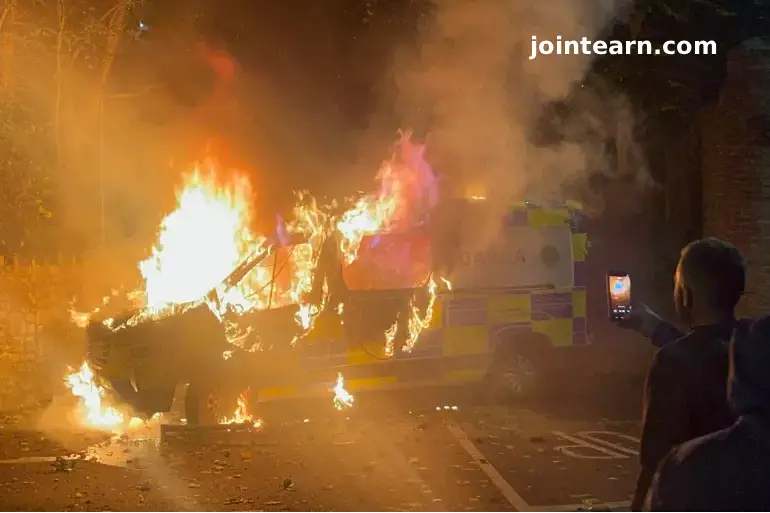
In one of the most violent anti-immigration protests Ireland has seen in years, hundreds of demonstrators clashed with police in southwest Dublin, torching a police vehicle and hurling fireworks and bottles at officers outside a hotel housing asylum seekers. The violent scenes unfolded late Tuesday near the Citywest Hotel in Saggart, southwest of the capital, following allegations of a sexual assault on a 10-year-old girl.
How the Protests Began
According to authorities, at least 1,000 protesters gathered outside the hotel, where many asylum seekers are temporarily accommodated. The unrest was triggered by reports that a 26-year-old man, believed to be an asylum applicant, was charged with sexually assaulting a child on the hotel grounds.
Local media reported that the accused, who required a Romanian interpreter during his court appearance, had recently arrived in Ireland seeking asylum. However, the Irish police (Gardaí) have not confirmed his nationality or immigration status.
The child, who is under the care of Tusla, Ireland’s child and family agency, had reportedly gone missing from a supervised trip to Dublin’s city centre. She was later found and the alleged incident took place shortly thereafter.
Protest Turns Violent
What began as a demonstration quickly spiraled into chaos. Protesters carrying placards reading “Irish Lives Matter” and chanting “Get them out!” launched fireworks and bottles at police lines. Witnesses described scenes of “total mayhem” as demonstrators overran barriers and torched a police van, sending flames and smoke billowing into the night sky.
Officers in riot gear responded with pepper spray and baton charges to disperse the crowd. Several minor injuries to both police and protesters were reported. The violence continued for hours as emergency services attempted to contain the blaze and secure the area around the hotel.
“The weaponising of a crime by people who wish to sow dissent in our society is not unexpected,”
said Justice Minister Jim O’Callaghan.
“This is unacceptable and will result in a forceful response.”
Prime Minister Micheál Martin also condemned the violence, calling the events “extremely serious and very grave,” warning that “those responsible will be brought to justice.”
Echoes of Past Riots
Tuesday’s protest marks the most significant outbreak of anti-immigrant unrest in Dublin since November 2023, when riots erupted following a stabbing outside a school that injured three children. That earlier incident saw far-right mobs storm the streets, attacking police, torching vehicles, and looting businesses in central Dublin.
During the 2023 riots, more than 400 officers were deployed to restore order, resulting in 34 arrests. Authorities at the time blamed “a small group of extremists” for exploiting public fear to incite hatred against immigrants.
“These groups exploit legitimate public anger over isolated crimes to push dangerous ideologies,” said a Garda spokesperson.
“They are not representative of Ireland’s values or people.”
Rising Anti-Immigration Sentiment in Ireland and the UK
Although Ireland has no far-right members of Parliament, anti-immigration sentiment has been growing across the country, fueled by social media misinformation and economic pressures linked to rising housing costs.
In Northern Ireland, similar unrest broke out in June 2025, when hundreds of masked rioters clashed with police in Ballymena after two teenage boys of Romanian descent were accused of sexual assault. Cars and buildings were set on fire, echoing scenes reminiscent of the recent Dublin violence.
Experts warn that such incidents reveal a troubling trend of xenophobic extremism spreading through online networks and far-right groups attempting to gain influence in Ireland’s political discourse.
Government Calls for Calm and Accountability
Irish officials have urged calm and stressed the importance of upholding the rule of law. Justice Minister O’Callaghan confirmed that dozens of people are under investigation for involvement in Tuesday’s riot, and additional arrests are expected.
The Gardaí said they are analyzing CCTV footage and social media posts to identify those responsible for inciting violence and spreading disinformation. Police officials have also pledged to increase patrols around asylum accommodation centres to prevent further attacks.
“No one should live in fear because of their nationality or background,”
said Minister for Integration Roderic O’Gorman, adding that Ireland “remains committed to compassion and fairness for those seeking refuge.”
Community Reaction and Social Impact
Local residents expressed mixed emotions over the protests. While many condemned the violence, others voiced concerns about transparency in Ireland’s asylum system and the strain on local resources.
Community leaders, however, warned that the far-right is manipulating genuine public frustrations to advance an agenda of division. Human rights groups have called on the government to implement stronger counter-extremism measures and invest in community integration initiatives.
“These violent acts don’t represent Irish hospitality or humanity,”
said a statement from the Irish Refugee Council.
“We must stand against hate and misinformation before it corrodes our social fabric.”
Conclusion: Ireland Faces a Crossroads
The Dublin riots of October 2025 underscore Ireland’s growing struggle with anti-immigrant sentiment, a challenge once thought to be limited to mainland Europe and the UK. As authorities continue their investigation, the government faces mounting pressure to address both public safety concerns and the root causes of xenophobic unrest.
The Citywest violence stands as a stark warning that misinformation, economic frustration, and online radicalization can quickly ignite into physical confrontation — threatening Ireland’s long-standing reputation as a welcoming and peaceful nation.


Leave a Reply